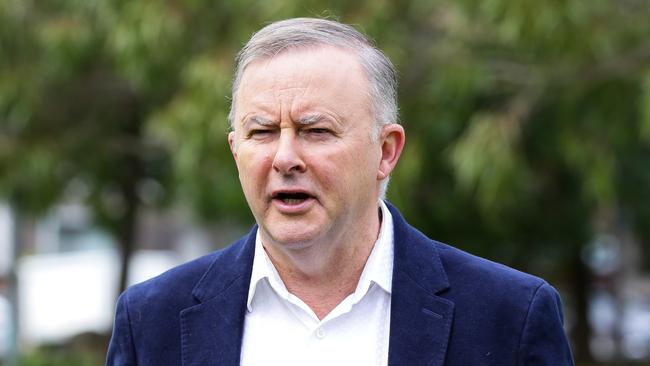
There is a forlorn sign on the fence of a house around the corner from us. It shouts out “2019 The Climate Election”. It’s still there, fading as the months pass.
Maybe the message was more accurate than the virtue-signalling resident realised. Climate change policies did concern voters — and Labor’s radical policies were firmly rejected.
It is dawning on some Labor politicians that their party has to walk back from the extremely high emissions reduction target it took to the election. The pledge was to reduce carbon dioxide emissions 45 per cent by 2030 relative to the 2005 level. The government’s policy involves a cut of between 26 and 28 per cent.
Other unsaleable policies included that half all new cars by 2030 would be electric. There was also going to be a “just transition” — as opposed to an unjust one — out of coal-fired power stations while “supporting workers and communities”, which went down like a lead balloon in parts of Queensland and NSW.
There was an electricity emissions trading scheme that inevitably would have generated a price on carbon. And there would be government funding for solar thermal plants, notwithstanding that these plants have been failures overseas. (One was planned for Port Augusta in South Australia; it is shelved.)
When it came to the Adani coalmine in north Queensland, Labor equivocated depending on the location of the spokesperson. It was a definite no in inner-city Melbourne but a wavering perhaps in Queensland. It irritated everyone.
But the critical defect in Labor’s climate change policies was the failure to provide any estimates of the cost of the policies in terms of gross domestic product, real wages and employment. Bill Shorten, then opposition leader, was seriously let down by climate change and energy spokesman Mark Butler. Based on a false sense of confidence about the election, Butler failed to commission any reliable analysis of the cost of Labor’s policies. Into this vacuum was sucked the credible work of Brian Fisher, former executive director of the Australian Bureau of Agricultural and Resource Economics.
Fisher’s work conceded the government’s policies would lead to adverse economic effects, but they were small. But he estimated that Labor’s would lead to a cumulative loss of GDP of between $264bn and $542bn by 2030, with real wages falling 3 per cent and 167,000 fewer jobs.
With no effective means of rebuttal, Shorten was forced to utter platitudes such as it was not possible to put a cost on Labor’s policies or the cost of inaction was higher. The voters weren’t in a mood for it.
Anthony Albanese has concluded it’s not possible to take the same target and policies to the next election. However, the Opposition Leader’s deluded attempt to establish a bipartisanship arrangement with the government on climate and energy policies won’t go anywhere.
Mind you, he is not suffering any shortage of advice, including from former Labor prime minister Kevin Rudd, who clearly has too much time on his hands given his numerous writings. It’s bold of Rudd to enter this debate. Having declared climate change the greatest moral challenge of our times, he failed to implement an emissions trading scheme while he was prime minister first time round. Second time around, he made a lot about abolishing the carbon price — she was happy to call it a carbon tax — that predecessor Julie Gillard introduced.
But according to Rudd, who regards himself as something of an expert on stimulus spending (pink batts, school halls, cheques to dead people), the government must juxtapose the spending required to offset the economic damage of COVID-19 with climate change mitigation. Something along the lines of a green new deal, also popular with several leaders of bankrupt European countries.
“Turbocharging this with a stimulus package for more renewable energy and storage of all sorts (including hydrogen), alongside extension and stabilisation technology for the electricity grid, and investment in dramatically improving energy efficiency would — literally and figuratively — power our economy forward.” That’s right, even more subsidies for renewable energy.
Rudd admits not all countries are taking his advice, which is a problem given that scientists acknowledge only global emissions count when it comes to climate. “The US economic recovery is heavily focused on high-emitting industries. The same is true in China, India, Japan and the large Southeast Asian economies. Beijing is approving plans for new coal-fired power plants at the fastest rate since 2015.”
Predictably, he writes approvingly of what the Europeans are up to — or say they are up to — but their total emissions are shrinking relatively as the size of their economies, with some exceptions, collapses after years of mismanagement.
We can be fairly certain the Morrison government won’t be paying much attention to Rudd. Nonetheless, there are the costly interventions in favour of renewable energy being rolled out in NSW under unimpressive Energy and Environment Minister Matt Kean, who seems to have joined the wrong party. While NSW taxpayers and customers must stump up for the additional transmission and distribution costs of the proposed renewable energy hubs, the sensible Treasurer is likely to baulk at entering into expensive power purchase agreements with the renewable energy companies. In this way, NSW will avoid the costly mistake made by the Victorian government.
In the meantime, the federal government will be focusing on the role cheaper gas can play in terms of electricity generation as well as reviving parts of manufacturing. COVID-19 has exposed the fragility of supply chains and underlined the need to expand local manufacturing.
Just watch out for gas becoming the new coal among self-serving renewable energy players already driving a campaign to denigrate the role of gas. Even former NSW premier Bob Carr — once an expert on China but now an expert on climate and business — has weighed into the debate.
For average Australians, jobs and paying the bills are among their top concerns now and in a post-COVID world. If cheaper gas can generate more jobs and more affordable and reliable electricity, then many voters will give it a tick. In contrast, renewable energy generates a trivial number of jobs and won’t form the basis of investment in heavy industry. Labor will just have to get with the program.



